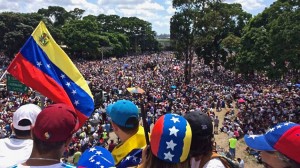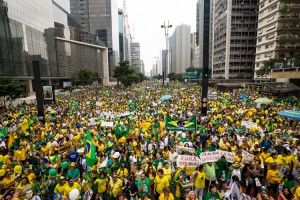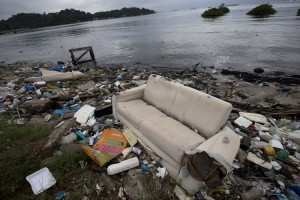Volatile Venezuela
Wednesday, September 20th, 2017September 20, 2017
Times have been tough for many Venezuelans in recent years, and times have only gotten tougher in 2017. The government of President Nicolás Maduro (in disputed power since 2013) proved as volatile as ever, threatening a number of “imperialist” adversaries (primarily, the United States) as well as many of the nation’s own citizens. As he has done before, Maduro pushed measures to broaden his own power, measures that were heavily criticized by nations around the world. On several occasions, protests against the Maduro administration turned violent, and clashes with security forces have killed hundreds of Venezuelans. Thousands of people have been arrested for supporting the “traitorous” opposition, and many still languish in jail cells without having been charged with a crime.

On May 20, 2017, people march in Caracas, Venezuela, to protest the government of President Nicolás Maduro. Credit: Voice of America
The chronically failing economy (inflation is hovering around 700 percent) has pushed people into ever-more-desperate poverty, driving some to crime and others to flee the country. Colombia, Venezuela’s neighbor to the west and closest national cousin, had to close the border to stop the flood of refugees, but several times the border has been temporarily opened to allow Venezuelans to purchase staple items such as chicken, rice, medicine, and toilet paper—items once scarce and now virtually extinct in many parts of Venezuela. In February 2017, the Peruvian government helped ease some of the pressure, granting 12-month work visas to some 6,000 Venezuelans. For Venezuela’s millions of other suffering citizens, however, there has been little to do but vent frustration.
At the end of March, President Maduro closed the opposition-dominated National Assembly (the main legislative body that has tried to remove Maduro from power). He then handed power to the Supreme Court of Justice—a body under Maduro’s direct supervision. Massive protests forced the reversal of this move, but dissatisfaction continued. During April and May, protests shut down parts of Caracas, the capital, and other cities. In July, millions of people walked off their jobs in a collaborative, nationwide strike that brought Venezuela to a standstill.
On July 30, several people were killed during a dubious election for posts on an assembly that will rewrite the nation’s constitution in Maduro’s favor. On a lighter note in September, Maduro’s “rabbit plan” (asking people to raise rabbits for food in the protein-strapped country) met ridicule and failure as the rabbit kits handed out were tied with bows and adopted as pets instead of being bred for future dinners.




